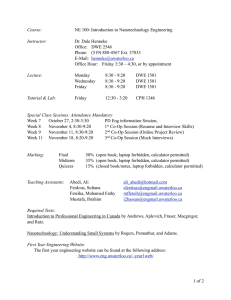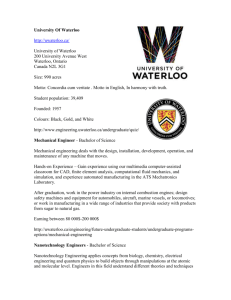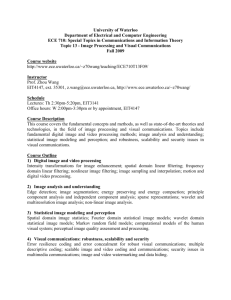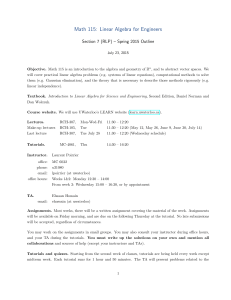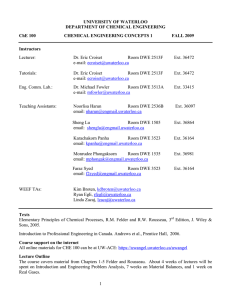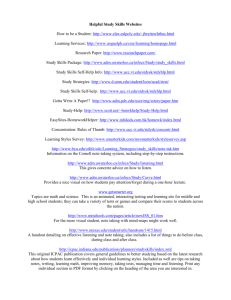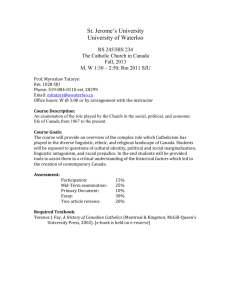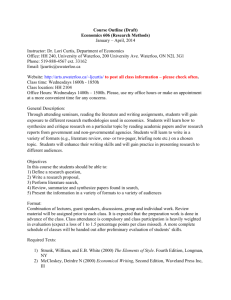NE-242 - Electrical and Computer Engineering
advertisement
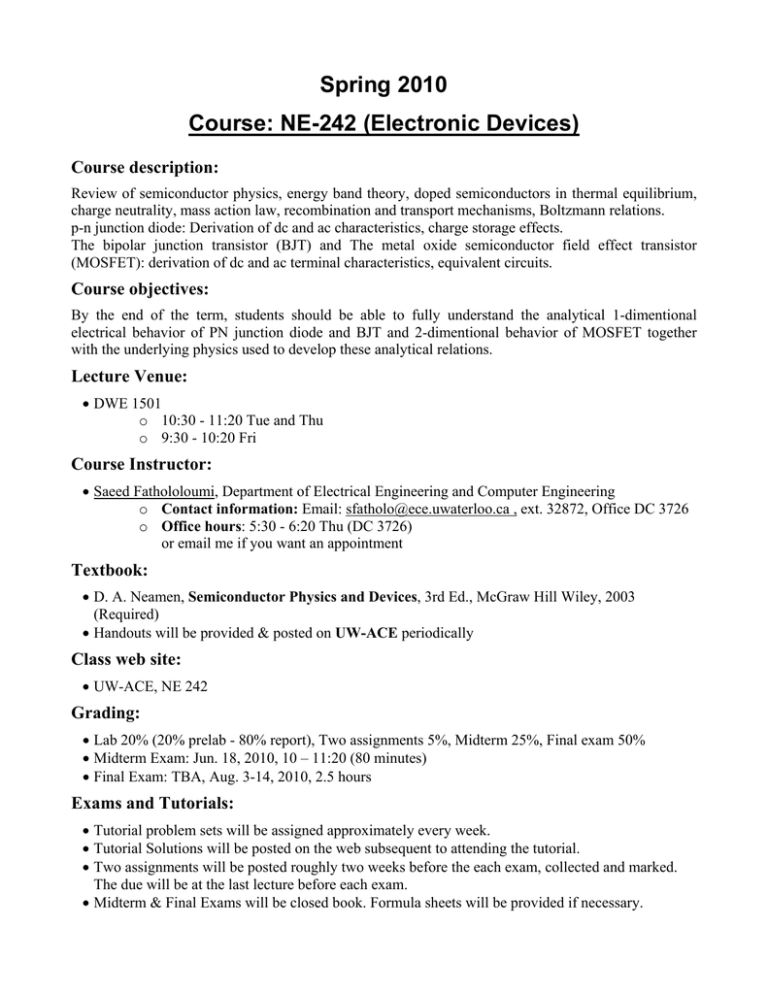
Spring 2010
Course: NE-242 (Electronic Devices)
Course description:
Review of semiconductor physics, energy band theory, doped semiconductors in thermal equilibrium,
charge neutrality, mass action law, recombination and transport mechanisms, Boltzmann relations.
p-n junction diode: Derivation of dc and ac characteristics, charge storage effects.
The bipolar junction transistor (BJT) and The metal oxide semiconductor field effect transistor
(MOSFET): derivation of dc and ac terminal characteristics, equivalent circuits.
Course objectives:
By the end of the term, students should be able to fully understand the analytical 1-dimentional
electrical behavior of PN junction diode and BJT and 2-dimentional behavior of MOSFET together
with the underlying physics used to develop these analytical relations.
Lecture Venue:
• DWE 1501
o 10:30 - 11:20 Tue and Thu
o 9:30 - 10:20 Fri
Course Instructor:
• Saeed Fathololoumi, Department of Electrical Engineering and Computer Engineering
o Contact information: Email: sfatholo@ece.uwaterloo.ca , ext. 32872, Office DC 3726
o Office hours: 5:30 - 6:20 Thu (DC 3726)
or email me if you want an appointment
Textbook:
• D. A. Neamen, Semiconductor Physics and Devices, 3rd Ed., McGraw Hill Wiley, 2003
(Required)
• Handouts will be provided & posted on UW-ACE periodically
Class web site:
• UW-ACE, NE 242
Grading:
• Lab 20% (20% prelab - 80% report), Two assignments 5%, Midterm 25%, Final exam 50%
• Midterm Exam: Jun. 18, 2010, 10 – 11:20 (80 minutes)
• Final Exam: TBA, Aug. 3-14, 2010, 2.5 hours
Exams and Tutorials:
• Tutorial problem sets will be assigned approximately every week.
• Tutorial Solutions will be posted on the web subsequent to attending the tutorial.
• Two assignments will be posted roughly two weeks before the each exam, collected and marked.
The due will be at the last lecture before each exam.
• Midterm & Final Exams will be closed book. Formula sheets will be provided if necessary.
Course Prerequisites:
Mandatory:
• NE125 (Introduction to Materials Science and Engineering)
• NE232 (Quantum Mechanics)
Preferred:
• NE122 (Organic Chemistry for Nanotechnology Engineers)
• NE131 (Physics for Nanotechnology Engineering)
• NE225 (Structure and Properties of Matter: From Nanoscale to Bulk)
Course outline:
• Chapter 1: Introduction to Semiconductors
• Chapter 2: The PN junction diode
• Chapter 3: The bipolar junction transistors
• Chapter 4: The metal-oxide-semiconductor field effect transistor (MOSFET)
• Chapter 5: The a-Si thin film transistor (TFT)
• Chapter 6: Organic semiconductors
Corresponding Book Charters
• Lecture Notes Chapter 1: {2.5 weeks}
Neaman: 1.1, 1.2, 1.3, 1.4, 2.2, 2.3, Chapter 3, 4, and 5, 6
• Lecture Notes Chapter 2: {2.5 weeks}
Neaman : Chapter 7, 8
____________mid-term_____________
• Lecture Notes Chapter 3: {3 weeks}
Neaman: Chapter 10 (10.1 to 10.7)
• Lecture Notes Chapter 4: {3 weeks}
Neaman: Chapter 11
• Lecture Notes Chapter 5 {0.5 weeks}
• Lecture Notes Chapter 6 {0.5 weeks}
____________Final exam_____________
Tutorial Venue:
Venue
Time
DWE1502
DWE1502
DWE1502
1:30 - 2:20 Fri
2:30 - 3:20 Fri
3:30 - 4:20 Fri
Teaching Assistants:
• Hussein Attia [h2attia@engmail.uwaterloo.ca] (Office hours: Thu 4:30-5:20 EIT3122)
• Jin Meng [j4meng@bbcr.uwaterloo.ca] (Office hours: Tue 4:30-5:20 EIT3129)
• Salman Kabir [s2kabir@engmail.uwaterloo.ca] (Office hours: Mon 4:30-5:20 DC3718)
• Mohamed Feteiha [mffeteih@engmail.uwaterloo.ca] (Office hours: Wed 4:30-5:20 EIT4148)
Lab Venue:
Venue
Time
E2 3344
E2 3344
E2 3344
1:30 - 4:20 Tue
1:30 - 4:20 Wed
1:30 - 4:20 Thu
Lab Instructor:
• Orion Bruckman, Department of Electrical Engineering and Computer Engineering
o Contact information: Email: obruckman@uwaterloo.ca , ext. 36134, Office E2 3348A
Academic Integrity: In order to maintain a culture of academic integrity, members of the
University of Waterloo community are expected to promote honesty, trust, fairness, respect and
responsibility. [Check www.uwaterloo.ca/academicintegrity/ for more information.]
Grievance: A student who believes that a decision affecting some aspect of his/her university life
has been unfair or unreasonable may have grounds for initiating a grievance. Read Policy 70,
Student Petitions and Grievances, Section 4, www.adm.uwaterloo.ca/infosec/Policies/policy70.htm.
When in doubt please be certain to contact the department’s administrative assistant who will
provide further assistance.
Discipline: A student is expected to know what constitutes academic integrity [check
www.uwaterloo.ca/academicintegrity/] to avoid committing an academic offence, and to take
responsibility for his/her actions. A student who is unsure whether an action constitutes an
offence, or who needs help in learning how to avoid offences (e.g., plagiarism, cheating) or
about “rules” for group work/collaboration should seek guidance from the course instructor,
academic advisor, or the undergraduate Associate Dean. For information on categories of
offences and types of penalties, students should refer to Policy 71, Student Discipline,
www.adm.uwaterloo.ca/infosec/Policies/policy71.htm. For typical penalties check Guidelines for
the Assessment of Penalties, www.adm.uwaterloo.ca/infosec/guidelines/penaltyguidelines.htm.
Appeals: A decision made or penalty imposed under Policy 70 (Student Petitions and
Grievances) (other than a petition) or Policy 71 (Student Discipline) may be appealed if there
is a ground. A student who believes he/she has a ground for an appeal should refer to Policy
72 (Student Appeals) www.adm.uwaterloo.ca/infosec/Policies/policy72.htm.
Note for Students with Disabilities: The Office for Persons with Disabilities (OPD),
located in Needles Hall, Room 1132, collaborates with all academic departments to arrange
appropriate accommodations for students with disabilities without compromising the academic
integrity of the curriculum. If you require academic accommodations to lessen the impact of
your disability, please register with the OPD at the beginning of each academic term.
May 2010
SUNDAY
MONDAY
{Lectures}, DWE 1501
{Extra Lectures}, DWE 1501
TUESDAY
WEDNESDAY
{Tutorials}, DWE 1502
{Labs}, E2 3344
THURSDAY
FRIDAY
SATURDAY
1
2
3
4 {10:30‐11:20}
5
6 {10:30‐11:20}
7 {9:30‐10:20}
{1:30‐2:20}
{2:30‐3:20}
{3:30‐4:20}
{11:30‐12:20}
8
9
10
11 {10:30‐
11:20}
{1:30‐4:20}
12 {1:30‐4:20}
13 {10:30‐
11:20}
{1:30‐4:20}
14 {9:30‐10:20}
{1:30‐2:20}
{2:30‐3:20}
{3:30‐4:20}
15
16
17
18 {10:30‐
11:20}
19
20 {10:30‐
11:20}
21 {9:30‐10:20}
{1:30‐2:20}
{2:30‐3:20}
{3:30‐4:20}
22
23
30
24
31
25 {10:30‐
11:20}
{1:30‐4:20}
26 {1:30‐4:20}
27 {10:30‐
11:20}
{1:30‐4:20}
28 {9:30‐10:20}
{1:30‐2:20}
{2:30‐3:20}
{3:30‐4:20}
29
June 2010
SUNDAY
MONDAY
{Lectures}, DWE 1501
{Extra Lectures}, DWE 1501
TUESDAY
WEDNESDAY
{Tutorials}, DWE 1502
{Labs}, E2 3344
THURSDAY
FRIDAY
SATURDAY
1 {10:30‐11:20}
2
3 {10:30‐11:20}
4 {9:30‐10:20}
{1:30‐2:20}
{2:30‐3:20}
{3:30‐4:20}
{11:30‐12:20}
5
6
7
8 {10:30‐11:20}
{1:30‐4:20}
9 {1:30‐4:20}
10 {10:30‐
11:20}
{1:30‐4:20}
11 {9:30‐10:20}
{1:30‐2:20}
{2:30‐3:20}
{3:30‐4:20}
12
13
14
15
16
17
18 Midterm
19
{10‐11:20}
20
21
22 {10:30‐
11:20}
{1:30‐4:20}
23 {1:30‐4:20}
27
28
29 {10:30‐
11:20}
30
July 2010
SUNDAY
MONDAY
TUESDAY
24 {10:30‐
11:20}
{1:30‐4:20}
25 {9:30‐10:20}
{1:30‐2:20}
{2:30‐3:20}
{3:30‐4:20}
{Lectures}, DWE 1501
{Extra Lectures}, DWE 1501
WEDNESDAY
26
{Tutorials}, DWE 1502
{Labs}, E2 3344
THURSDAY
FRIDAY
SATURDAY
1
2 3
4
5
6 {10:30‐11:20}
{1:30‐4:20}
7 {1:30‐4:20}
8 {10:30‐11:20}
{1:30‐4:20}
9 {9:30‐10:20}
{1:30‐2:20}
{2:30‐3:20}
{3:30‐4:20}
10
11
12
13 {10:30‐
11:20}
14
15 {10:30‐
11:20}
16 {9:30‐10:20}
{1:30‐2:20}
{2:30‐3:20}
{3:30‐4:20}
{11:30‐12:20}
17
18
19
20 {10:30‐
11:20}
{1:30‐4:20}
21 {1:30‐4:20}
22 {10:30‐
11:20}
{1:30‐4:20}
23 {9:30‐10:20}
{1:30‐2:20}
{2:30‐3:20}
{3:30‐4:20}
{11:30‐12:20}
24
25
26
27 {10:30‐
11:20}
28{9:30‐10:20}
{1:30‐2:20}
{2:30‐3:20}
{3:30‐4:20}
29
30
31
